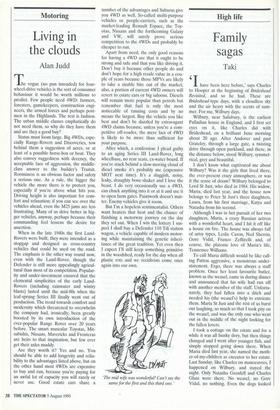Motoring
Living in the clouds
Alan Judd
he vogue (no pun intended) for four- wheel-drive vehicles is the sort of consumer behaviour it would be worth millions to predict. Few people need 4WD: farmers, foresters, gamekeepers, construction engi- neers, the armed forces and perhaps post- men in the Highlands. The rest is fashion. The urban middle classes emphatically do not need them, so why do they have them and are they a good buy?
Status must loom large. Big 4WDs, espe- cially Range-Rovers and Discoveries, tow behind them a suggestion of acres, or at least of a possible horse-box or boat. They also convey ruggedness with decency, the acceptable face of aggression, the middle- class answer to the builder's Transit. Roominess is an obvious factor and safety a serious one. As a rule, the bigger the vehicle the more there is to protect you, especially if you're above what hits you. Driving height is also important for com- fort and relaxation; if you can see over the vehicles ahead, even the M25 jams are less frustrating. Many of us drive better in big- ger vehicles, anyway, perhaps because their commanding feel lessens the desire for assertion.
When in the late 1940s the first Land- Rovers were built, they were intended as a stopgap and designed as cross-country vehicles that could be used on the road. The emphasis is the other way round now, even with the Land-Rover, though the Defender is still more appealingly agricul- tural than most of its competition. Popular- ity and under-investment ensured that the elemental simplicities of the early Land- Rovers (including rainwater and wintry blasts) lasted until the mid-80s when the leaf-sprung. Series III finally went out of production. The trend towards comfort and modernity which threatened to overwhelm the company had, ironically, been greatly boosted by its own introduction of the ever-popular Range Rover over 20 years before. The smart muscular Toyotas, Mit- subishis, Nissans, Mavericks and Fronteras are heirs to that inspiration, but few ever get their aides muddy.
Are they worth it? Yes and no. You should be able to add longevity and relia- bility to the advantages listed above, but on the other hand most 4WDs are expensive to buy and run, because you're paying for an awful lot of capacity you will rarely or never use. Good estate cars share a number of the advantages and Subarus give you 4WD as well. So-called multi-purpose vehicles or people-carriers, such as the market-leading Renault Espace, the Toy- otas, Nissans and the forthcoming Galaxy and VW, will surely prove serious competition to the 4WDs and probably be cheaper to run.
Apart from need, the only good reasons for having a 4WD are that it ought to be strong and safe and that you like driving it. Don't buy it because other people do and don't hope for a high resale value in a cou- ple of years because those MPVs are likely to take a sizable bite out of the market; also, a portion of current 4WD owners will revert to estate cars or big saloons. Diesels will remain more popular than petrols but remember that fuel is only the most noticeable of running costs and by no means the largest. Buy the vehicle you like best and don't be dazzled by extravagant 4WD claims because, unless you're a com- petitive off-roader, the mere fact of 4WD is likely to be more than sufficient for your purpose.
After which, a confession: I plead guilty to an aging Series III Land-Rover, long wheelbase, no rear seats, ex-water board. If you're stuck behind a slow-moving cloud of diesel smoke it's probably me (expensive MOT next time). It's a sluggish, noisy, leaky, draughty bone-shaker and I love the beast. I do very occasionally use a 4WD, can chuck anything into it or at it and use it to open farm gates. Paintwork doesn't mat- ter. Enemy vehicles give it room.
But I'm a hopeless sentimentalist. Others want heaters that heat and the chance of finishing a motorway journey on the day they set out. When I win the lottery I sus- pect I shall buy a Defender 110 Tdi station wagon, a vehicle capable of modern motor- ing while maintaining the genetic inheri- tance of the great tradition. Yet even then I expect I'll still keep something primitive in the woodshed, ready for the day when all plastic rots and we recidivists come once again into our own.
The mid wife was wonderful! Can't say the same for the first and this third one.'


















































 Previous page
Previous page